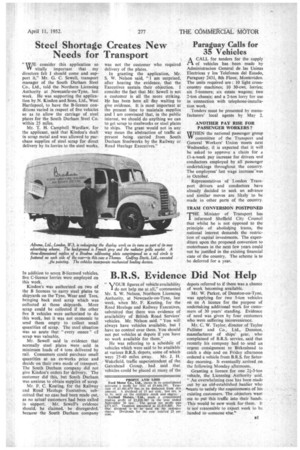Steel Shortage Creates New Needs for Transport
Page 35

If you've noticed an error in this article please click here to report it so we can fix it.
WE consider this application so
IT vitally important that my directors felt I should come and support it," Mr. G. C. Sewell, transport manager of the South Durham Steel Co., Ltd., told the Northern Licensing Authority at .Newcastle-on-Tyne, last week. He was supporting the application by N. Kindon and Sons, Ltd., West Hartlepool, to have the B-licence conditions varied in respect of five vehicles so as to allow the carriage of steel plates for the South Durham Steel Co. within 25 miles.
Mr. T. H. Campbell Wardlaw, for the applicant, said that Kindon's dealt in scrap metal and was allowed to purchase supplies of steel scrap for direct delivery by its lorries to the steel works.
In addition to seven B-licensed vehicles, five C-licence lorries were employed on this work.
Kindon's was authorized on two of the B licences to carry steel plates to shipyards on the Tyne, Wear and Tees, bringing back steel scrap which was collected at those shipyards. More scrap could be collected if the other five B vehicles were authorized to do this work, but it was not economic to send them empty to collect small quantities of scrap. The steel situation was so acute that "every ounce" of scrap was valuable.
Mr. Sewell said in evidence that normally steel plates were sold in minimum loads of 4 tons delivered by rail. Consumers could purchase small quantities at an ex-works price and decide on their own mode of transport. The South Durham company did not give Kindon's orders for delivery. The customer did this, but South Durham was anxious to obtain supplies of scrap.
Mr. F. C. Keating, for the Railway and Road Haulage Executives, submitted that no case had been made put, as no actual customers had been called in support. Mr. Sewell's evidence should, he claimed, be disregarded, because the South Durham company was not the customer who required delivery of the plates.
In granting the application, Mr. S. W. Nelson said, "I am surprised, after hearing the evidence, that the Executives sustain their objection. I consider the fact that Mr. Sewell is not a customer is all the more striking. He has been here all day waiting to give evidence. It is most important at the present time to maintain supplies and I am convinced that, in the public interest, we should do anything we can to get scrap to steelworks or steel plates to ships. The grant would not in any way mean the abstraction of traffic at present being carried from South Durham Steelworks by the Railway or Road Haulage Executives."




















































































